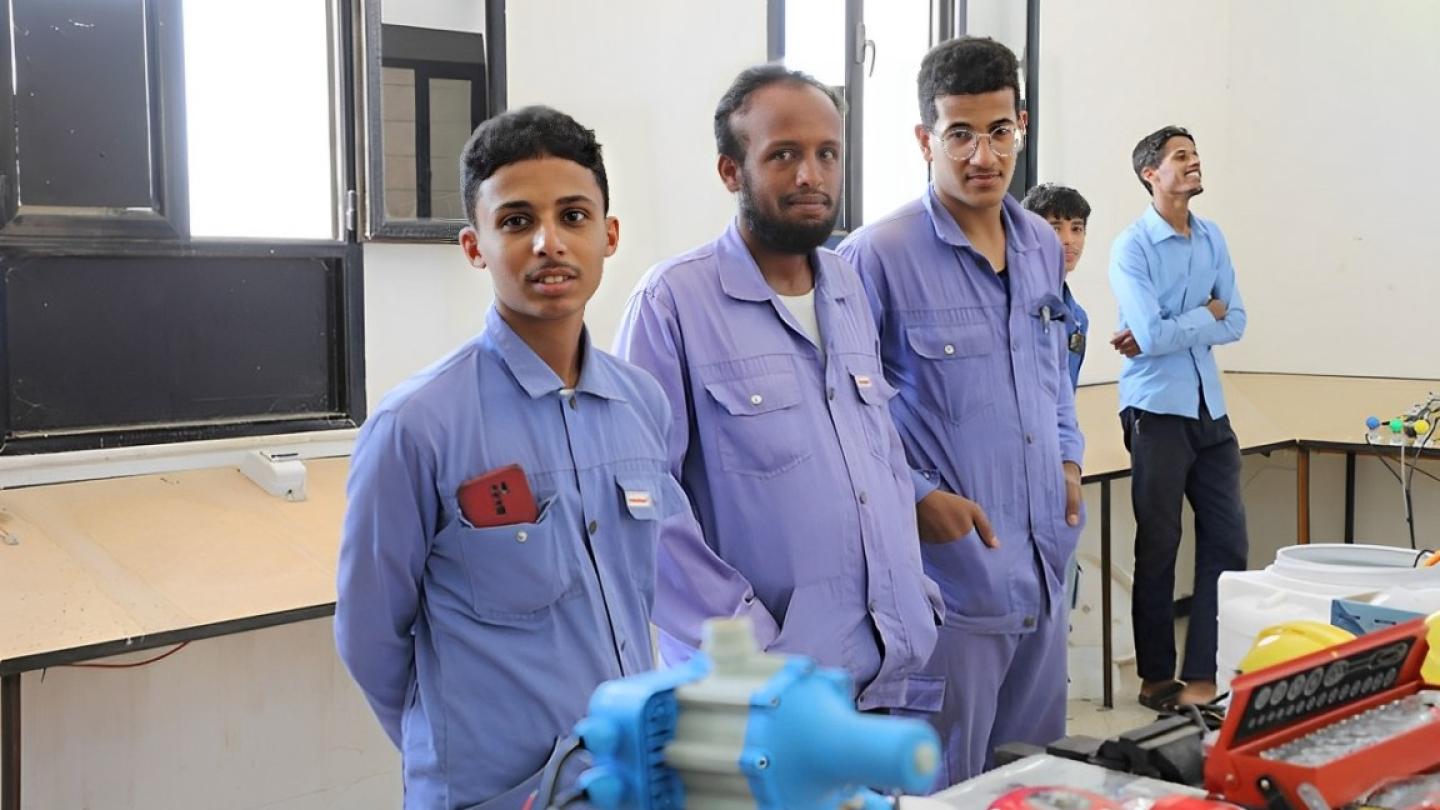Building a more resilient education system in Yemen
August 1, 2024

A school student during a class at one of the schools rehabilitated by local authorities in Aden with support from the SIERY Project.
School-aged children in Yemen represent nearly 33 percent of the population. Over two-thirds of them live in hard-to-reach areas. According to recent reports, approximately 4.5 million Yemeni children did not attend school in 2023, while 2,426 schools have sustained damage or are not functioning due to use for shelter or non-educational purposes.
Nine years into conflict in Yemen, displaced children and youth remain among the most vulnerable to education disruptions, with around 1.3 million coping with overcrowded classrooms and overburdened teachers. In times of crisis and displacement, education plays a pivotal role in providing a sense of stability and normalcy for children and young people. Ensuring internally displaced persons have quality education is a prerequisite for recovery and peace.
Teachers are also on the frontline of this crisis. Overcrowded classrooms and limited access to professional development opportunities hinder their ability to work, and which can lead to them leaving the profession.

School students playing during recess at one of the schools rehabilitated by local authorities in Aden with support from the SIERY Project.

A teacher delivering a class in front of school children at one of the schools rehabilitated by local authorities in Aden with support from the SIERY Project.
How local authorities are responding
Education plays an important part in fostering resilient societies; therefore, to shape sustainable futures, education itself must be resilient to change and crises. With support from the Strengthening Institutional and Economic Resilience in Yemen (SIERY) Project, funded by the European Union, local authorities are restoring education in Yemen. This includes adding new classrooms and renovating existing ones, adding hygiene facilities and solar power in more than 70 schools.
Primary and secondary schools
“We noticed a decline in dropout rates and increased motivation and positive attitudes among our students since the installation of the solar power system,” said Hala, Principal of Khawla Bint Al-Azwar Primary and Secondary School, one of 21 schools that now have solar power in Hadhramaut.
Khawla Bint Al-Azwar has around 1,500 girls and young women, including a number with disabilities. Due to strong demand and limited capacity it operates in two shifts a day.
“Since the installation of the solar power system, we are able to prolong the time students and teachers stay in the classroom, especially during evening shifts,” Hala says.
Located in Mukalla, Hadhramaut, on the coast of the Arabian Sea, students and staff endured overcrowded and humid classrooms, especially during summertime, with limited to no electricity.
“We can also now organize extracurricular activities for our students, which makes them more excited to come to school and improves their overall performance.”

Sawsan instructing an English language class at Khawla Bint Al-Azwar School.
“I am now able to use the computer for comprehension and listening exercises. Having electricity at the school has helped me deliver my classes and ensure that my students receive the quality of education they deserve,” said Sawsan, who teaches English.
Recent data has revealed that young people are deterred from going into teaching because of the working conditions.
Tertiary education
Central to the SIERY Project’s promotion of SDG4 is its support for local authorities’ initiatives in promoting higher education.
In Tarim, local authorities wanted to rehabilitate, equip and furnish the National Health Institute to facilitate higher education opportunities for young people. Today it offers courses such as nursing and midwifery to around 60 young women and men.
“I was motivated to study here because the institute is close to where I live. Before, we had to go to Seiyun University to pursue a higher education degree. More women are now able to obtain higher education degrees because of this campus,” said Aisha, a midwifery student.
Sumaya, a physiotherapist and a teacher at the institute, explained; “I am from Tarim, but to obtain my degree a few years ago, I had to leave home at six am to get to my classes in Seiyun and return at around four pm, which was hard as a new mother. Convincing my family to let me make this daily trip was not easy either.”
While the trip from Tarim to Sieyun is only a forty-minute drive, poor infrastructure, road closures and security issues make it challenging. "Having this institute here now means that more young people, especially women, have access to education. It benefits our society,” said Sumaya.
Technical and vocational education and training
Technical and Vocational Training and Education (TVET) is key to addressing one of the greatest challenges for young people in Yemen: unemployment. Equipping TVET colleges with the equipment ensures young people’s empowerment, productive employment, and eases their transition into the workforce. With support from the SIERY Project, local authorities equipped Al-Qatn's Academic Complex with furniture, tools, lab equipment, and IT resources, information and communication technology. Around 900 young women and men are studying there.
Capacity building for local authorities, district education offices, and education personnel
Places of education should be safe havens where students learn, play, and are protected. It is where their minds can inquire, explore, and develop to their fullest potential. UNDP Yemen works with educational and local authorities to create a safer and more inclusive learning environment, where everybody is provided with the skills to cope with life’s challenges and to better align with Yemen’s job market needs.
These programmes were made possible thanks to the European Union.

Iben Zaidoun Elementary School, one of the schools rehabilitated by local authorities in Aden with support from the SIERY Project.

 Locations
Locations












